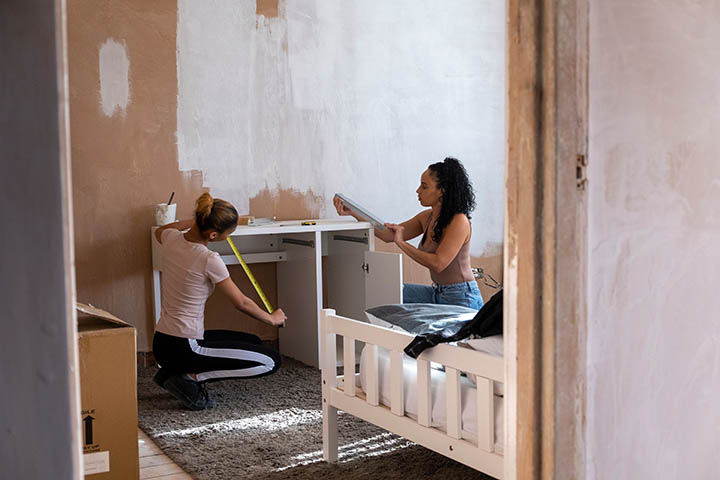Whether you’re looking to install a shiny new kitchen, or simply spruce up the paintwork, a home improvement loan could help turn your dreams into reality.
What are home improvement loans?
A home improvement loan is money borrowed to fund a project around your house. This could be anything from a new bathroom suite to redecorating the living room.
Secured and unsecured home improvement loans
Two popular options when considering home improvement borrowing are secured and unsecured loans.
A secured loan is typically for a larger amount of money, which could be a consideration for a big project such as a renovation or extension.
When you take out a secured loan, you ‘guarantee’ you’ll repay the money by providing the lender with a form of collateral; this is usually your home. If you default on your secure loan repayments, the lender could take possession of your collateral to recover their costs. The last thing anyone wants is to risk losing their home, so you should think very carefully before taking out a secured loan and be sure you can make your repayments on time each month.
With an unsecured loan, you’re not required to provide collateral on the money you borrow. Because of this, unsecured loans are sometimes seen as more of a risk to the lender and, as such, interest rates are generally higher than those offered on secured loans.
Viva Money do not work with any lenders offering secured loans.
Our panel of lenders offer unsecured loans from £100 to £10,000, with terms between 3 and 60 months.

Who can apply for an unsecured home improvement loan?
You can search for an unsecured home improvement loan with Viva Money if you:
- Are over the age of 18 years old;
- Have a UK registered address;
- Have a UK-issued bank account and valid debit card; and
- Have a regular source of income paid directly into your bank account.
Can I apply for a home improvement loan with bad credit?
Yes, you can apply for a home improvement loan even if your credit score is a little worse for wear. Some of the lenders on the Viva Money panel specialise in loans for those with less-than-perfect credit scores.
A lower credit score may make it harder to get approved for a loan and could limit your borrowing options. If you are approved for a loan, you may find that you are offered a higher interest rate or a more manageable loan amount.
If you’re worried about your credit history, you might decide to work on improving your credit score before you apply for a loan. A better credit score could mean that you are offered a wider range of credit options or a lower rate of interest.
Ways to improve your credit score
Fortunately, there are things you can do to work towards improving your credit score.
- Register to vote. Signing up to the electoral roll will make it easier for lenders to identify you at your current address.
- Check your credit report for errors and highlight any incorrect information as soon as possible. Even something as small as a misspelled address could have a negative impact on your credit score. If you spot any errors, contact your credit reporting tool and ask them to correct it.
- Avoid making multiple credit applications over a short space of time. Numerous hard credit searches may harm your score.
- Pay your bills and any other current credit commitments on time. Avoid missing or defaulting on repayments.
- Consider a credit-building credit card. Using a credit builder credit card responsibly alongside other credit building methods could help boost your score over time.
Could taking out a home improvement loan affect my credit score?
When you apply for a loan directly with a lender, they are required to carry out a hard search on your financial history. Hard searches are visible to other lenders and can remain on your credit file for up to 12 months. Too many hard searches over a short period of time could harm your credit score.
Viva Money use soft search technology to search for a suitable loan. Soft searches do not affect your credit score in any way.
If you make your repayments on time each month and clear the balance of your loan within your chosen term, there’s a chance that you may see an improvement in your credit score.
On the other hand, if you default on your repayments, it’s possible that your credit score will decline as a result.
How can I apply for a home improvement loan with Viva Money?
Our process is straightforward. We’ve broken it down into four simple steps below to give you an idea what to expect.
Step one
Make a list of everything you expect to pay for and set a budget for your home improvements. Select your ideal loan amount and repayment term. You should never borrow more money than you actually need or can afford to repay.
Fill out our online form, answering each question as accurately as you can.
Step two
We’ll run a soft search on the information you’ve provided and scan our panel of lenders for a suitable match. If we’re able to find you a loan, you’ll be redirected to the lender’s website to complete some further checks, including a hard credit search.
Step three
If the lender is happy with the outcome of their checks, you’ll be sent a loan agreement. Read through this carefully before you sign and be sure that you can comfortably make the monthly repayments without this affecting any of your priority bills, such as rent or mortgage, utilities, and food.
Step four
Use the money to fund your home improvements and pay back the balance of the loan within the agreed term.
How can I reduce the cost of home improvements?
Doing your research before you take on any home improvement could save you money.
- Shop around. When searching for the right people for the job, don’t feel obliged to go with the first quote you’re given, especially if it’s a little more than you were hoping to pay. Seek more than one quote and compare prices.
- A friend in need. Have you got a pal who’s a dab hand at tiling, or a father-in-law with some mean DIY skills? Why not see if they’d be willing to offer ‘mates rates’ and help you out?
- Community spirit. Before you fork out on expensive equipment, check to see if somebody local could lend you the tools. Social media community groups are good places to start.
- Do it yourself. Stripping that wallpaper yourself might take a bit longer, but it will save you hiring someone to do it for you, cutting back on the overall cost of the job. Of course, any tasks that are potentially dangerous or involve electrics or gas should be left to professionals.
I’m struggling to keep up with my repayments – what can I do?
If you fall into difficulty when repaying either your secured or unsecured loan, you should contact your lender as soon as possible. There are things they can do to help relieve some of the pressure, and they will want to work with you to come up with a suitable solution.
If you have a secure loan and you miss your repayments, the lender is within their right to seize the collateral – for example, your home or car - tied to the loan to recoup their losses.
Talking about money worries can feel make us uncomfortable but know that reaching out is the first step towards taking back control. Free, impartial, non-judgmental advice is readily available online through sites such as Citizens Advice, MoneyHelper, and National Debtline.
Viva Money are proud to have teamed up with debt charity StepChange to provide a free, online Money Health Check quiz. The answers you provide will remain confidential and will generate advice and tips to help your current financial situation.







